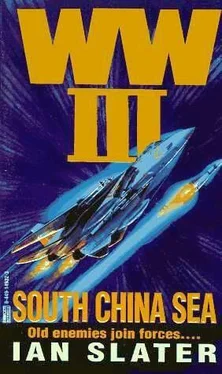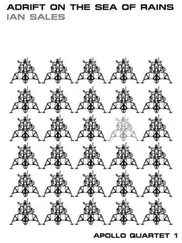Accordingly, Freeman, his G2 section telling him of suddenly increased enemy radio traffic after the Enterprise attack, ordered his DEF commanders and Airborne to prepare for massive tujidui thrusts later that day, probably beginning at sundown and possibly going on all night. Air interdiction would be maintained by the Enterprise fliers, but the closer the PLA got to the Dien Bien Phu garrison before they attacked, the less help the garrison could expect, as once the Chinese began “bear-hugging,” closing with the Dien Bien Phu defenders, U.S. artillery and airpower would have to cease because of the danger of decimating their own troops. Then not even “Spooky,” the awesome AC-47 festooned with heavy-caliber machine guns, infrared scopes, TV cameras, and a 105mm howitzer, could be used, for fear of killing the Dien Bien Phu defenders as well as the attacking Chinese.
Despite this danger, and as a further countermeasure to what Freeman believed would be Wang’s biggest massed attack so far, Freeman, after conferring with Berry, Leigh-Hastings, Roscoe, and with the Airborne commander, decided that starlight scope patrols would be sent out before sunset and position themselves in the thick vegetation around the half-mile-diameter circle. Their job would be to “sniper” anything that moved, in hopes of first breaking up Chinese concentrations massing for attack, and second, locating and identifying, by radio and red flare, enemy concentrations, which Skyraiders— the old faithfuls, with a loiter time of up to eight and a half hours — could then bomb and strafe, in addition to the indirect fire from the American batteries behind the hills of Dien Bien Phu.
But if the present fine weather had given Freeman a break and allowed him to launch the deforestation attacks, the lack of mist also meant that the American 105mm and 155mm batteries’ positions could be seen by PLA patrols, and by 1630 hours, out of ten USVUN batteries south, behind Dien Bien Phu, seven had been overrun by PLA storm troopers. Both sides had paid a price, Wang having lost over four hundred men in Freeman’s FAE/Snakeye and laser-guided bomb attacks, and the garrison’s defenders losing over forty-two gunners, one small consolation being that all but one of the seven American guns overrun had been spiked before being taken and so were of no use to the PLA.
Each commander had now forced the other’s hand. Any further delay by one would mean the other would have time to plug the gaps so recently opened.
At 1630 six starlight patrols began edging out from the perimeter east and west of Nam Yum River. Immediately there was trouble, as over half were engaged by PLA snipers, some of whom had come right up to the tree line of the perimeter, forcing the USVUN snipers back into the circle around DEFs triangle.
“Maybe we can try later when it’s dark,” Leigh-Hastings opined.
“We’ve got no choice,” Berry answered. “Trouble is, they’ve still got a lot of vegetation on the valley floor, while their artillery has done a real job on ours. We’ve got nothing but a few dead trees and bare earthworks.”
“All the better to see ‘em when they rush us, Colonel,” Leigh-Hastings said.
“You think they’ll rush us?” he asked the Englishman, feigning surprise.
“Mad if they don’t, old boy.”
There was a screech of incoming, and they instinctively ducked even though they were in the HQ bunkers.
Roscoe came in through the burlap bag flap. “Colonel?”
“What is it?” Berry asked.
“Some of those reinforcements Freeman has sent in — some of Vinh’s boys among them — are worried about old tunnels. Some of them are saying their kinfolk fought here against the French, and they think—”
“Jesus!” Berry said. “They think the PLA are using them?”
“Some of ‘em, at least, Colonel. That’s why there’re so many all at once when they come at us from the trees. No movement in the trees during the day — zilch — but come nightfall—”
“Right,” Berry said. “Send out probe teams, bayonets, any damn thing you can find.”
Ten minutes passed, a long time with barely an hour of daylight left, before squads ventured out from the trenches to probe the earth about the perimeter.
Almost immediately there was the screech of incoming, only this time the bombardment increased, the vibration of the H.E. shells shaking the earth so violently that streams of dirt were falling from the roof of Berry’s bunker. “Some bastard’s watching us!” Doolittle said in one of the trenches.
“You don’t say,” an SAS trooper said.
“I do fucking say, and anybody who shows his scalp’ll fucking well lose it!”
“Shut up!” yelled Martinez, still in shock over D’Lupo’s death.
In Colonel Berry’s bunker the consensus was that the bombardment would not cease till nightfall.
“You think we can stop them?” someone asked Roscoe.
“I don’t know. I need to get through to Freeman for TACAIR.”
An army in retreat is never a pretty sight, but with the flooding of the plains north of Disney and the mangled rail line of the culvert in their way, Wang’s soldiers were in no mood to be merciful to any escaping POW they found, and eleven escapees from the camp near Ningming were summarily butchered with bayonets, their heads and the remainder of their bodies floating aimlessly in the waist-deep flood fields south of Xiash.
With only five miles in a direct line to go to the border, Shirley Fortescue in PLA uniform, Danny Mellin, and Murphy purposely lengthened their route by heading due east instead of south. It was harder going, but Mellin needed no argument to make his case that it was safer, after the three of them had seen bloodless torsos and heads float by, eyes picked clean.
* * *
“Why in hell don’t they send in Tomahawks?” Martinez asked, wondering why the Enterprise had not weighed in with the wizardry of the terrain-contour-matching guided cruise missiles, the wonder weapons of the Iraqi War. “The carrier too far out?”
Doolittle was about to answer when instead he ducked down in the trench as more incoming slammed into the circle outside DEF’s triangle. “No,” Doolittle said, “the carrier’s close enough in — few hundred miles is no trouble for a Tomahawk — but it’s got to have a particular target programmed into it. In Baghdad you had specific buildings, but here all there is is fucking jungle.”
“Well,” Martinez responded, brushing off mud and dirt from around his neck, “I wish to hell they’d drop a big blue.” He meant the 12,500-pound gelled slurry of ammonium nitrate, aluminum powder, and polyethylene soap.
“Gotta be careful with that one,” another SAS trooper said. “Drop it too close to us, it’ll suck the air right out of our lungs, matey, as well as the chinks’.”
The tempo of the shelling abruptly increased as the Chinese fired “time on target,” the worst form of artillery for the victims, as it is concentrated and coordinated so every round hits simultaneously, saturating the target, in this case the DEF triangle, with high explosive. It was bad news all around, for it meant that in order to mount such a time on target offensive, the Chinese must have restored communications between various gun positions in the hills, despite the earlier Enterprise strikes.
Berry ordered no flares be sent up, that starlight-scoped M-16s take the front foxholes on the perimeter. He’d no sooner given the order than he heard, “At the wire!” and the battle of small arms erupted, the USVUN defenders outnumbered four to one in the first wave. The enfilade of fire was deafening, the fighting at the outer perimeter already hand-to-hand, sacrificial Chinese sappers with charges strapped to them hurling themselves at the razor wire, blowing up themselves and gaps through the rolls of wire. The starlights’ green, blurry images were shot down with impunity, but the numbers of attacks seemingly never ended, as for every dead man, another rose in his place.
Читать дальше












